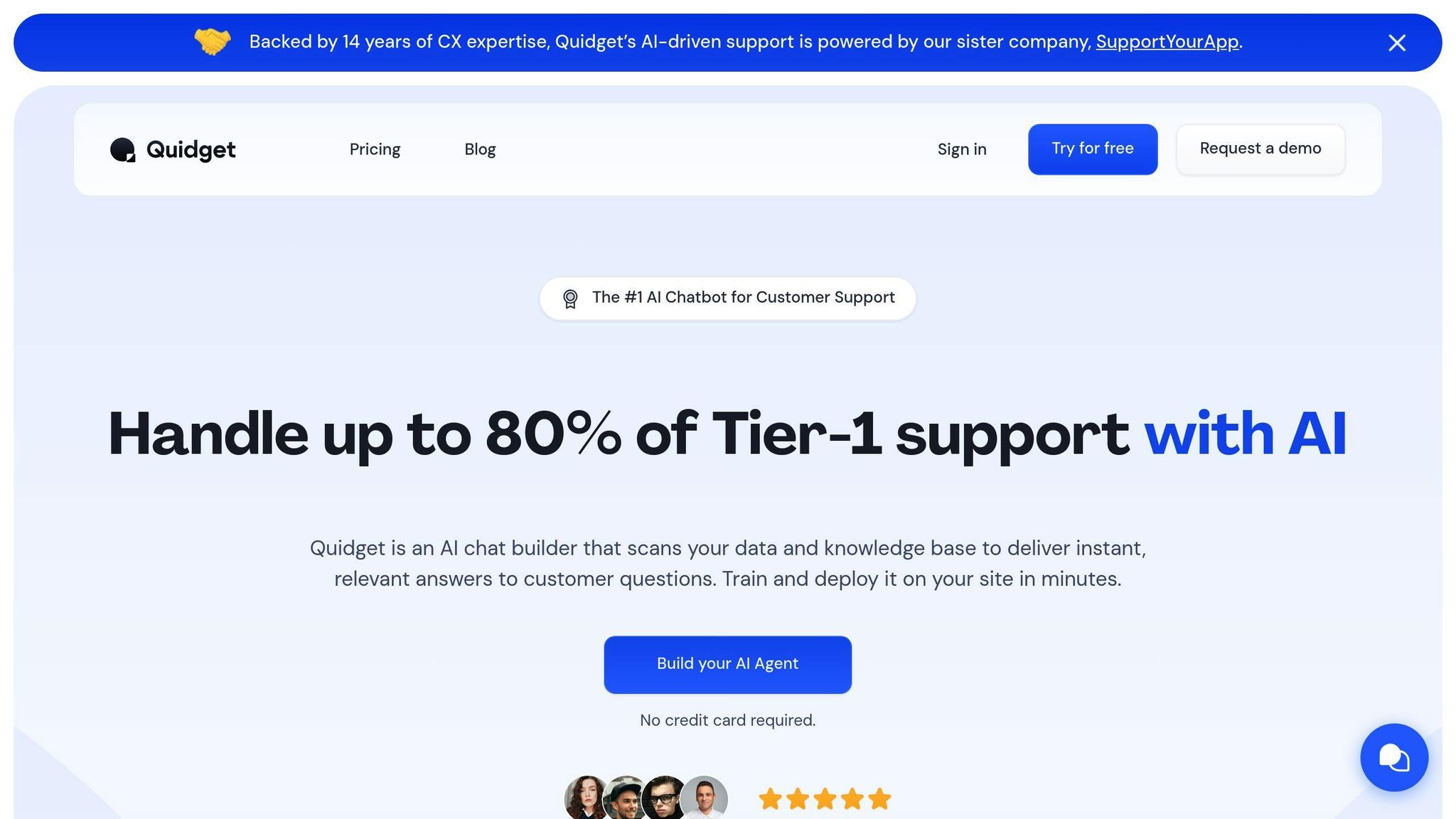57% of customers don’t trust companies to use AI responsibly. Bridging this trust gap is critical for businesses using AI. Ethical AI focuses on principles like transparency, privacy protection, and accountability to ensure AI systems are fair and trustworthy. Here’s how companies can build customer trust with ethical AI:
- Transparency: Clearly disclose AI usage and decision-making processes.
- Data Protection: Safeguard customer data with strong privacy measures like encryption and GDPR compliance.
- Responsible Deployment: Partner with human rights experts, mitigate bias, and maintain human oversight.
- Customer Engagement: Share AI practices openly and gather feedback to improve systems.
Companies like Salesforce are leading by integrating these practices into their AI tools, showing that ethical AI isn’t just about responsibility – it’s also a way to strengthen customer loyalty and gain a competitive edge.
Understanding AI Ethics and Governance: How to Build Trust in Technology

Core Principles of Ethical AI
Recent statistics reveal that 51% of customers are more likely to trust AI when businesses provide clear, public information about their research and methods.
Being Transparent About AI Use
Ellen Nielsen, formerly with Chevron, emphasizes, "Transparency is paramount to maintaining consumer trust." This makes openness a critical element of ethical AI practices.
Here’s how businesses can ensure transparency:
| Transparency Element | Implementation Approach |
|---|---|
| AI Disclosure | Clearly notify customers when they interact with AI systems. |
| Decision-making Process | Provide documentation outlining how AI decisions are made. |
| Research Publication | Share development methodologies publicly. |
| Performance Metrics | Offer regular reports on AI accuracy and updates. |
While transparency is essential, safeguarding customer data is equally important for building trust.
Protecting Customer Data
With 71% of customers expressing a desire for more control over how businesses use AI at a personal level, strong data protection measures are non-negotiable.
Key data protection practices include:
| Protection Measure | Purpose |
|---|---|
| Clear, Informed Consent | Obtain explicit permission for data collection and usage. |
| GDPR Compliance | Adhere to international privacy regulations. |
| Secure Storage | Use encryption for data storage and transfers. |
| Access Controls | Restrict access to sensitive customer data. |
| Regular Audits | Conduct routine reviews of data handling practices. |
Securing data is just the beginning – how AI is deployed also plays a crucial role in maintaining ethical standards.
Deploying AI Responsibly
59% of customers are more inclined to trust AI solutions developed in partnership with human rights experts. According to the United Nations University, openly disclosing AI usage promotes accountability and consumer protection.
A great example is Salesforce’s Einstein GPT, which integrates privacy, safety, and inclusivity into its framework. These practices not only ensure compliance but also enhance customer confidence in AI systems.
Responsible AI deployment involves bias mitigation, ongoing performance checks, human oversight, clear documentation of decisions, and rapid resolution of issues when they arise.
sbb-itb-58cc2bf
Steps to Build Customer Trust with Ethical AI
Data reveals that businesses focusing on ethical AI practices gain stronger customer confidence and engagement.
Sharing AI Practices with Customers
Being open about how AI is used builds trust. In fact, 71% of customers want more clarity on how businesses use AI in their interactions.
| Communication Element | How to Implement It |
|---|---|
| Usage Disclosure | Inform customers when AI is in use and explain how their data is handled. |
| System Updates and Reports | Provide updates and share metrics on AI performance and improvements. |
Transparency is only the first step. Actively involving customers through feedback ensures their concerns are acknowledged and addressed.
Getting Feedback from Customers
Gathering customer input is key to shaping ethical AI practices. Businesses that actively listen to their customers foster stronger trust.
| Feedback Channel | Purpose |
|---|---|
| Surveys and Analytics | Gather feedback during interactions and track satisfaction levels. |
| Customer Interviews | Dive deeper into user experiences to identify pain points and opportunities. |
| Social Media Monitoring | Quickly address public concerns and identify trends. |
Customer feedback is crucial, but human oversight plays a vital role in maintaining fairness and accountability.
Using Human Oversight for AI Decisions
Human involvement is critical for creating accountability. 59% of customers report greater trust in AI systems developed with input from human rights experts.
Key elements of effective human oversight include:
- Clear Escalation Paths: Set up clear procedures for when AI decisions require human review.
- Expert Review Process: Regularly audit AI outcomes with qualified experts to ensure fairness.
- Customer Support Integration: Enable smooth transitions between AI systems and human agents for complex issues.
"Ethical AI is a pressing concern for our customers and for our customers’ customers. Getting it right means creating AI with trust at the centre of everything you do." – Kathy Baxter, Principal Architect, Responsible AI & Tech at Salesforce
Tools and Platforms for Ethical AI
Using the right tools and platforms helps businesses put ethical AI principles into practice while building trust with their users. These tools must align with ethical standards and still deliver effective, real-world results.
Quidget: AI for Customer Support with Ethics in Mind

Quidget is a great example of how ethical AI can be applied in customer support. Here’s what it offers:
| Feature | How It Helps |
|---|---|
| Knowledge-Based Training | Ensures accurate and verified responses |
| Seamless Escalation | Connects users directly to human agents when needed |
| Multilingual Support | Provides access in over 80 languages for inclusivity |
| AI Transparency | Clearly communicates when users are interacting with AI |
Staying Compliant with Legal and Regulatory Standards
For ethical AI to succeed, businesses must follow current regulations while keeping customer trust intact. Here are some key areas to focus on:
| Requirement | How to Address It |
|---|---|
| Privacy Standards | Be transparent about data handling and follow privacy laws |
| System Documentation | Maintain clear records of AI processes and decisions |
| Customer Rights | Offer easy opt-in options and control over AI interactions |
| Performance Monitoring | Regularly evaluate how well the AI system is working |
To uphold these standards, organizations should:
- Conduct frequent reviews of AI systems for compliance.
- Keep detailed documentation of how AI operates.
- Update privacy policies to reflect ethical practices.
- Train staff thoroughly on ethical AI guidelines.
Conclusion: Ethical AI Builds Customer Confidence
Ethical AI isn’t just about making the right decisions – it also plays a key role in driving business growth. With only 57% of customers trusting companies to use AI responsibly, this trust gap presents both a challenge and an opportunity for organizations adopting AI technologies.
Taking a clear and customer-first approach to AI can lead to real, measurable benefits. Here’s what the data highlights:
| Trust Factor | Business Impact |
|---|---|
| Transparency | Boosts customer engagement |
| Expert Collaboration | Strengthens solution credibility |
| Customer Feedback | Improves system reliability |
By consistently applying these strategies, businesses can build trust that serves both their customers and their bottom line. Tools like Quidget, paired with transparent practices and responsible AI deployment, showcase a commitment to ethical AI, fostering customer confidence and loyalty.
"Trust is the foundation of AI success, requiring consistent ethical practices and customer-centric deployment." – Eduardo Azanza, CEO at Veridas
The message is clear: companies that prioritize ethical AI practices, maintain transparency, and focus on their customers will be better equipped to thrive in an AI-driven world. By bridging the trust gap with these principles, businesses can build long-lasting relationships rooted in confidence and mutual respect.



